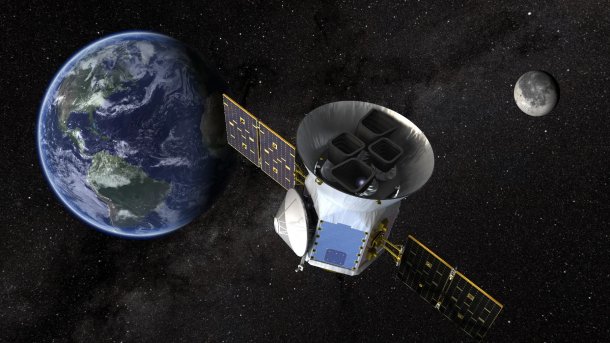Search for exoplanets paused: TESS space telescope in safety mode
TESS has been searching for exoplanets with great success for six years. Now the space telescope has partially switched itself off twice. It is unclear why.

Artistic representation of TESS
(Bild: NASA’s Goddard Space Flight Center)
For the second time in just over two weeks, NASA's exoplanet hunter TESS has put itself into safety mode and stopped collecting scientific data. The US space agency announced this and explained that the partial shutdown took place on Tuesday during a routine activity. The agency is working on restarting the space telescope completely and at the same time trying to find out whether there is a connection to a similar incident on April 8. At that time, the device was put back into operation nine days later, apparently without the cause of the first switch to safety mode having been determined.
Kepler's successful successor
There is no further information on the two incidents. The Transiting Exoplanet Survey Satellite was launched in April 2018 as the successor to the highly successful exoplanet hunter Kepler. While Kepler dedicated its main mission to a narrowly limited area of the sky in detail, TESS searches almost the entire sky- but for a shorter period of time in each sub-area. TESS focuses on a 24° by 96° region of the sky for at least 27 days at a time and examines the stars in it for periodic eclipses. These may indicate exoplanets orbiting their star within a few days - many of them much closer than Kepler's findings.
The two incidents have now occurred around the sixth anniversary of the launch of TESS. By then, the space telescope had discovered over 7100 possible exoplanets using its method, 440 of which have already been confirmed. This means that the device has long since established itself as the second most important discoverer of planets around other stars. Kepler currently has 2774 confirmed exoplanet discoveries, with just under 2000 still awaiting confirmation. Together, more than half of all 5616 confirmed exoplanets have been found by one of the two space telescopes. More than 10,000 candidates have yet to be confirmed.
Empfohlener redaktioneller Inhalt
Mit Ihrer Zustimmmung wird hier ein externer Inhalt geladen.
Ich bin damit einverstanden, dass mir externe Inhalte angezeigt werden. Damit können personenbezogene Daten an Drittplattformen übermittelt werden. Mehr dazu in unserer Datenschutzerklärung.
The article includes an interactive graphic created and delivered by the Berlin-based service provider Datawrapper. For data protection at Datawrapper, see their privacy policy. No personal or personally identifiable data is collected from readers of the interactive charts.
(mho)